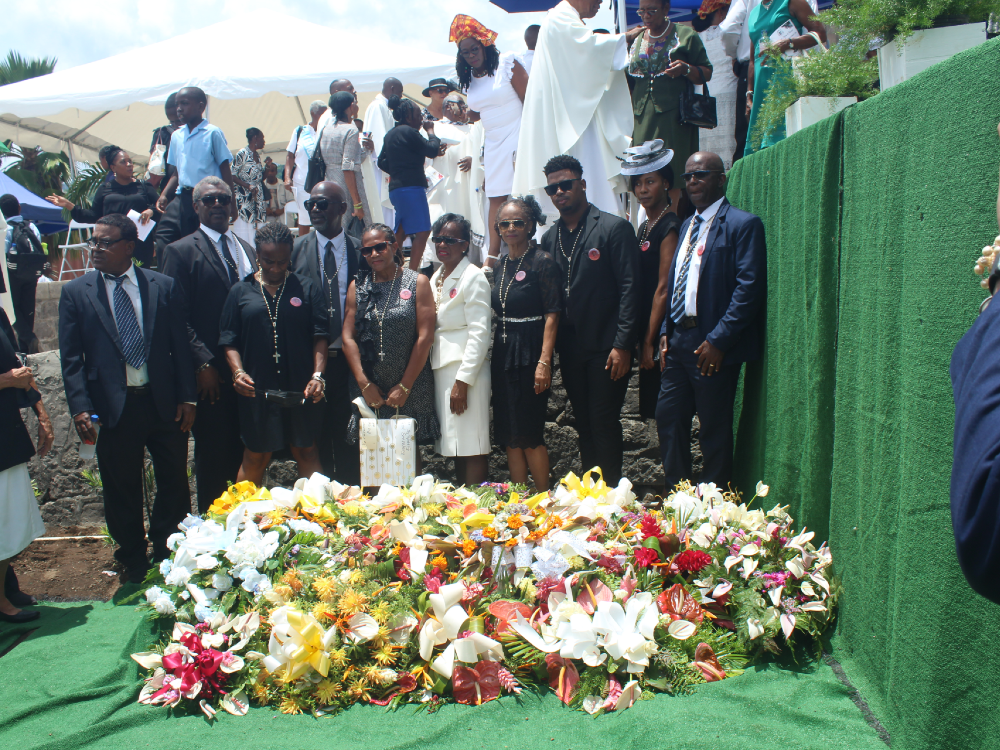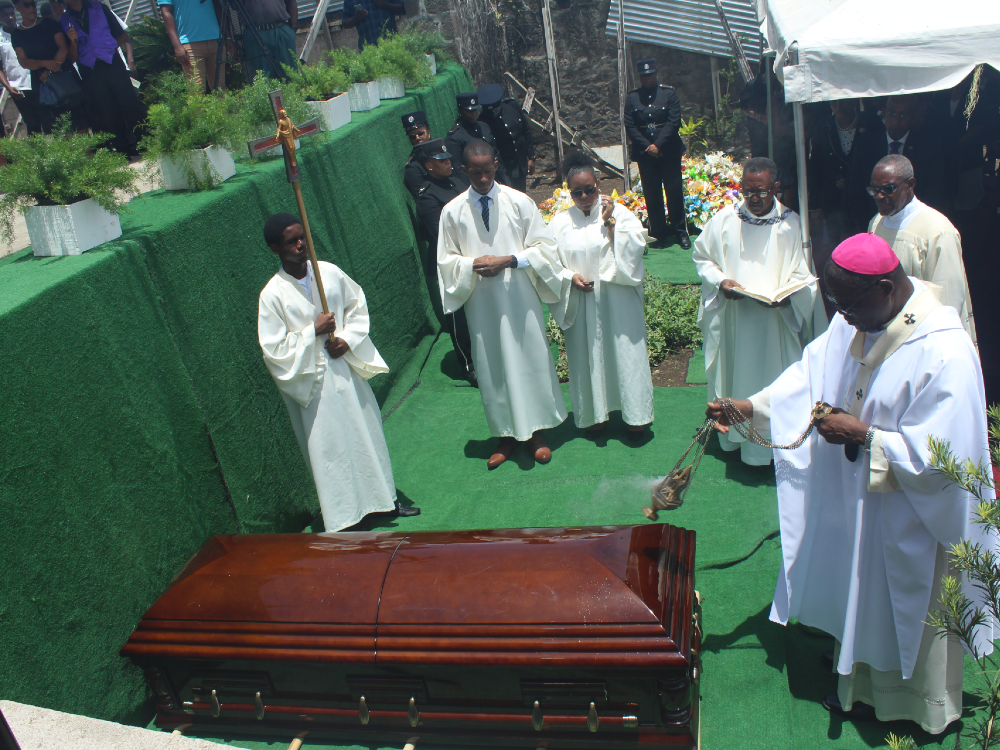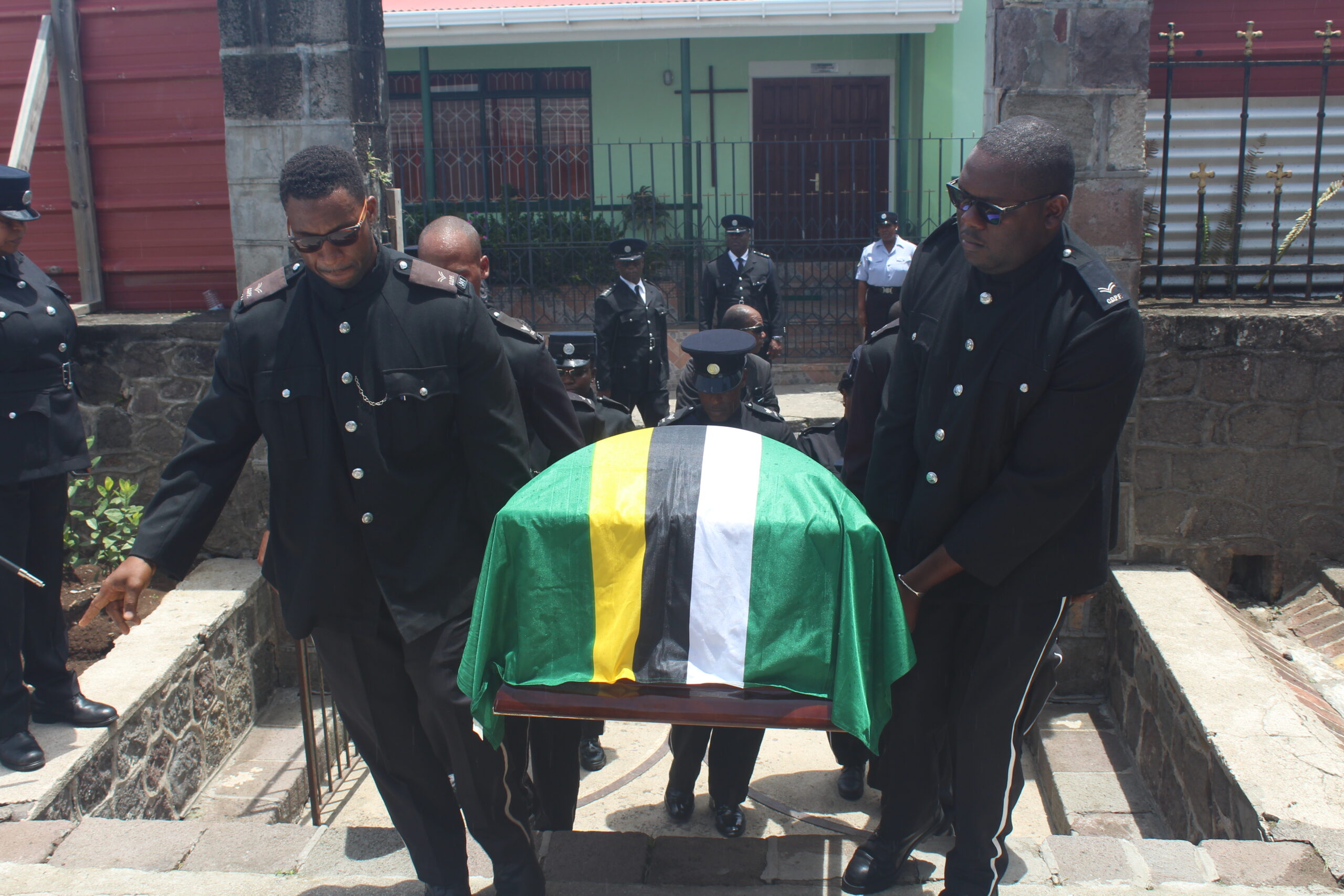
The Cathedral Chapel was filled as members of the clergy, family, friends, and well-wishers gathered for the Memorial Mass of H.E. Kelvin E. Cardinal Felix on Wednesday, June 19, 2024.
Among those present were the President of Dominica Her Excellency Sylvanie Burton President of the Commonwealth of Dominica and Mr.Burton, Prime Minister Roosevelt Skerrit and members of his Cabinet, and Speaker of the Dominica House of Assembly Joseph Isaac.
St. Lucia’c Prime Minister Phillip J. Pierre, Pastor Randy Rodney President of the Dominica Association of Evangelical Churches -DAEC, Dr. Didacus Jules, Director General of the OECS, Cluney Sisters, school children, and members of the Catholic community.
His Grace Archbishop Gabriel Malzaire who is also the Apostolic Administrator of the Diocese of Roseau was the main celebrant also with priests from the Diocese and Castries St. Lucia.



Find the Homily of Archbishop Malzaire.
Job 19:1, 23-27; 2Tim 2:8-13; Matt 5:1-12
“A Life for God’s People”
Dear brothers and sisters in Christ, the principal symbols which identify a bishop are his ring, pectoral cross, mitre, and crozier. The bishop’s ring and pectoral cross are signs of his fidelity to the Church. The ring and the pectoral cross are worn both during and outside of Mass. The mitre and crozier are signs of his authority and jurisdiction; these are worn only during the celebration of Holy Mass. Today, I wish to focus a little on the Cross and its pastoral significance in the life of a Bishop.
Those who receive correspondence from a bishop may have noticed that he sometimes places a small cross before his name or signature. That cross is symbolic of his recognition of being a “sinner”, that is, one who needs the redeeming cross of Jesus Christ.
In one of his retreats for priests, Archbishop Fulton J. Sheen, of revered memory, once said that he wore his pectoral cross in reparation for the effects of sin in the world. Therefore, the sign of the cross as a prefix to the name of the bishop indicates that the redeeming and repairing work of his ministry begins with himself. It begins with the fact that he, the bishop, who represents the fullness of Christ’s priesthood amid his flock, has symbolically laid down his life for that flock three times: as deacon, as priest, and as bishop. This is demonstrated in his prostration during the Litany of the Saints at his ordination ceremonies.
We are gathered here to bid farewell to a beloved son of the Dominican soil who has done just that; he has laid down his life for his Caribbean people. And he did so with such distinction that the Holy Father, Francis, saw it fit to elevate him with the honour of the Cardinalate. We cannot but appreciate the sacrifice that this man of God has made for the sake of God’s people in the Diocese of Roseau, in the Caribbean, and the world.
The first reading today comes from the Book Job. The Book of Job is indeed the longest parable in the Holy Scriptures. It seeks to communicate a new understanding of God’s relationship with humanity. The Old Testament spirituality before Job dictates that punishment is a sign of God’s curse, whereas success is a sign of God’s blessing. The Book of Job, however, introduces a new perspective of the divine-human relationship. It is a story of the complete loss and deprivation in the life of a man of faith, seemingly a sort of punishment, and ending eventually in the overwhelming divine response of complete restoration of what was lost. Never having turned away from God, despite the counsel of his friends, Job in the end enjoys the benefit of God’s total clemency. It serves as a prefiguration of the life of Christ.
Inspired by the spirituality that surrounds the story of Job, I would like to situate the life and commitment of our dear Cardinal within the context of the world in which we live, a world of growing opposition to religious sentiments and spiritual values. Even in the early years of his priesthood, when the religious fervour in the region was much stronger, there were challenges. I recall the stories he told of being the only black man on the clerical block and the religio-cultural battles he endured, but very quietly, for the sake of a people, of a Church that he loved. He had truly embraced the Cross of our Lord Jesus Christ, akin to what St. Paul speaks of in his letter to the Colossians when he says:
“It makes me happy to suffer for you, as I suffer now, and in my own body to do what I can to make up all that has to be undergone by Christ for the sake of His body, the Church” (Col 1:24).
This, to my mind, represents the quality of the man to whom we bid farewell today. It is essentially what our participation in the priesthood of Jesus Christ means—a vocation of redemption, a vocation of reparation.
Just to put in context the redeeming and repairing work of this man of God: of his 68 years of ordained ministry, Cardinal Felix wore the pectoral Cross for 43 years — 27 in active ministry and 16 as emeritus. A very rough calculation of the number of Masses he would have offered on behalf of God’s people reveals that:
Within the 68 years of ordained ministry, he would have celebrated approximately 7,027 Masses on Sundays alone, comprising: 52 weeks x 68 years x 2 Masses/Sunday. Knowing him, he would have celebrated Mass every day of the week which would total 21,216 Masses, composed of 52 weeks x 6 days x 68 years. This adds to a total of 28,243 Masses since ordination. Now, this calculation does not factor in all the weddings, funerals, anniversaries, etc., which he celebrated. As much as these figures are far from being accurate, they provide a snapshot of the approximate number of times our dear Cardinal placed himself at the altar of God pleading for a renewed people, a renewed community, and a renewed world. His was truly “A Life for God’s People.”
Like the prophet Job in today’s reading, I am certain that our dear Cardinal would like to say to us here in the Diocese of Roseau and the rest of the Antilles:
“Ah, would that these words of mine were written down, inscribed on some monument, with iron chisel and engraving tools, cut into the rock forever” (Job 19:23-24).
Cardinal desired so much that the fruits of his labour be indelibly written on the hearts of his people. As the first local priest to be ordained in Roseau, he specifically requested to be buried at the entrance of the Cathedral. You will see later today or after, that his tomb is placed in a strategic position so that, as the faithful proceed to the Church for sacred worship, he will be remembered as one who laboured hard and long in the Lord’s vineyard for his people. Therefore, his redeeming and repairing work continues.
- He will be remembered as a man of prayer, one who spent time daily before the Blessed Sacrament, praying not only for himself but for people everywhere.
- He will be remembered as a generous priest, who ensured that many had access to education and opportunities for a brighter future.
- He will be remembered for his availability, listening ear, advice, quality of his instructions, and readiness to provide support and understanding.
- He will be remembered as one to be emulated by the young and not so young; to inspire vocations to the priesthood and the religious life.
- He will be remembered as the one who in the 1970s, during the Black Power movement, came to the rescue of St. Mary’s Academy, the only Catholic Boy’s Secondary School in the country, and brought it back on the road to success that it continues to enjoy even today.
- He will be remembered as a man of unity, leading the Church’s indispensable mission to ecumenism in the Antilles region—a mission which presently is crying out for much-needed attention.
- He will be remembered as the humble servant of God who, despite his rank, wanted to be addressed simply as Fr. Felix.
His tomb will be a permanent fixture in the Cathedral yard to remind the entire faithful of the Diocese of Roseau and other visitors, that there stands among us one who had risen to the highest ecclesiastical office, simply by his quest to imitate the one who called him from his mother’s womb 91 years ago.
It is not without reason that today’s Gospel selection is that of the Beatitudes, which reveal that the way to true Christian commitment, the way to the kingdom, the way to true happiness, is always the narrow way, presented by our Blessed Lord via negativa—the negative way. This means that what the world regards as contemptible and foolish, is salvific in the scheme of things divine. It is indeed the way that our beloved brother chose for his own sake and the sake of God’s people. This is akin to the words of St. Paul in today’s second reading as he speaks to his spiritual son, Timothy. He says to him, and therefore to us:
“Remember the gospel that I carry, ‘Jesus Christ was risen from the dead … It is on account of this that I have to put up with suffering, even being chained like a criminal. But God’s message cannot be chained up. So I persevere for the sake of those who are chosen, so that they, too, may obtain the salvation that is in Christ with eternal glory” (2 Tim 2:8-10).
My dear friends, as we bid our last farewell to a man who placed his entire life in the gap, as our Lord did, for the salvation of His people, it would be a great consolation to him while he enjoys his well-deserved glory with the Father, that his work was not in vain. If by his life example, he can inspire one young man to the priesthood, the diaconate or brotherhood, or one young woman to the religious life, or one young couple to the faithful conjugal union, his long and hard work would not be in vain. If he can inspire us all to a life of deeper prayer, to generosity with the gifts we have received, to concern for the children especially the less fortunate, and to lead others to Jesus, his long and hard work would not be in vain. As his remains are laid to rest in the Cathedral yard in the view of all the faithful, let him be a continual source of inspiration to God’s people here in the Diocese of Roseau and beyond.
May his soul, and the souls of all the faithful departed, through the mercy of God rest in peace. Amen!

